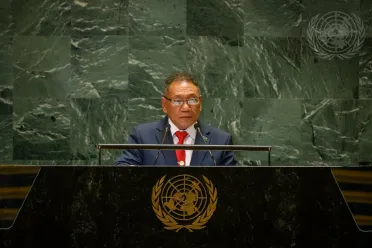Statement
Statement summary
PETER SHANEL AGOVAKA, Minister for Foreign Affairs and External Trade of Solomon Islands, said it is vital to reform the Bretton Woods institutions to ensure they are democratic and adequately represent the rise of the Global South, as well as the multidimensional challenges facing small island developing States. He also reiterated the call for establishing a permanent seat for those countries in decision-making within the international financial architecture. Noting that in the last 46 years, the United Nations has conducted its relations with his country “from a distance”, he called for an enhanced UN country presence in Solomon Islands, the third-largest Pacific country as well as one of the least developed countries of the world. Highlighting a foreign policy based on the principle of “friends to all, and enemy to none”, he said it upholds respect for the sovereignty and territorial integrity of all 133 countries it has formalized relationships with — this includes respect for the One China principle. It is urgent to reform the Council with equitable geographical representation and revised working methods, he said, urging delegates to shift into text-based negotiations this session.
Condemning the terror attack on Israel by Hamas, he said it is unacceptable that Israel’s collective punishment on Gaza has claimed more than 41,000 Palestinian lives in less than a year. Those with influence must do more for peace instead of fanning the flame of the expanding conflict into Lebanon. Reaffirming the inalienable right of self-determination of New Caledonia and French Polynesia, he said the recent brutal violence in the former calls for a new political solution. Solomon Islands has already banned single use plastics, he announced, while looking forward to the finalization of negotiations on the treaty to end plastic pollution, including in the marine environment, in November this year. Expressing concern about the discharge of treated radioactive contaminated water into the ocean by Japan, he said “the lack of national and regional scientific knowledge on understanding the intergenerational impact and the transboundary nature of the discharge continues to cause uneasiness and anxiety.” The International Atomic Energy Agency (IAEA) and other specialized agencies must support State capacity to monitor this, he said, highlighting the “sad history of our region being used to test, store and dump nuclear weapons and waste”.
Thanking Cuba for training of medical students from his country, he said that country has done this despite enduring more than six decades of economic, commercial and financial embargo by the United States. Welcoming the power of South-South cooperation, he highlighted China’s various development initiatives and its commitment to establish an Ocean Research Center. That country has become Solomon Islands’ largest infrastructure partner and is currently supporting its digital transformation with the installation of 161 communication towers. Turning to climate change, he noted that his country is located in a hot spot where the impact of climate change is three times the global average. “The voluntary approach under the Paris Agreement has failed miserably,” he said, calling for a stronger legally binding framework that will put the international community on a 1.5°C trajectory. “The changing narrative on climate change is unacceptable,” he said, adding that ambitious climate action has been replaced by a “discussion on sinking and migration”. Calling on the Group of Twenty (G0), which is responsible for 80 per cent of global emissions, to take a stronger leadership in the fight against climate change, he said his Government is working to ensure a smooth transition from its least developed country status.
Full statement
Read the full statement, in PDF format.
Photo

Previous sessions
Access the statements from previous sessions.
